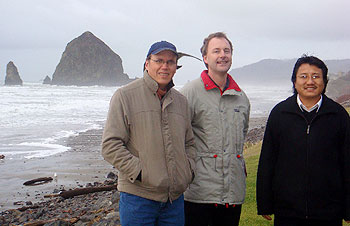
Paul Saintilan (center), one of the originators of the Buddhist Recovery Network idea, with fellow conference participants Kevin Griffin (l.) and Dr. Chencho Dorje (r.), at Cannon Beach, Oregon, January 2008.

International "Buddhist Recovery
Network" Launched at Oregon
Conference
Buddhist principles and practices are increasingly recognized as skillful means in the effort to recover from addictive behaviors.
In January a group of delegates from the United States, Canada, Australia and Bhutan assembled at Cannon Beach, Oregon to discuss the formation of an international organization devoted to sharing and supporting Buddhist recovery resources and experiences. The result was the founding of the Buddhist Recovery Network.
Delegates to the Oregon meeting created the organization's Mission Statement:
The Buddhist Recovery Network supports the use of Buddhist teachings, traditions and practices to help people recover from the suffering caused by addictive behaviors.
Open to people of all backgrounds, and respectful of all recovery paths, the organization promotes mindfulness and meditation, and is grounded in Buddhist principles of non-harming, compassion and interdependence.
It seeks to serve an international audience through teaching, training, treatment, research, publication, advocacy and community-building initiatives.
The idea for a Buddhist Recovery Network originated with Australian Paul Saintilan, with the support of Kevin Griffin, American author of the popular recovery book, "One Breath at a Time," and UW professor G. Alan Marlatt, Director of the Addictive Behaviors Research Center.
In addition to these three, the founding board of directors includes Santa Cruz psychologist, Dr. Ann Bolger, and Sheila Blackford, JD, Practice Management Advisor with the Oregon State Bar Professional Liability Fund. The composition of the board reflects the fact that the west coast of the U.S. is, according to Saintilan, "the most mature and active region for applying Buddhism to recovery from addiction."
Saintilan has for several years maintained a Buddhist recovery website based in Sydney, Australia, which will now become the hub of the international Buddhist Recovery Network (www.buddhistrecovery.com.) The organization plans to establish an archive at the UW Addictive Behaviors Research Center and to present a Conference in the U.S. in the fall of 2009. Professor Marlatt will represent the Network at the 5th UK/European Symposium on Addictive Disorders (8-10 May 2008 in London.)
The Buddhist Recovery Network is open to people of all backgrounds, not only those who identify themselves as 'Buddhist.' Some of the Network's organizers and advisors do not consider themselves to be Buddhists, but all possess an altruistic motivation to help people recovering from the suffering caused by addictive behaviors. They share a belief in the efficacy of certain Buddhist practices to assist in this process.
In their experience, Buddhist principles and practices can strengthen and deepen sobriety and prevent relapse. Buddhist meditation can help those in recovery become more aware of habitual patterns of behavior, and let them go. Buddhist practice can also help people become more aware of the impact of their actions on others and so cultivate a stronger ethical foundation.
"The Buddha pointed to clinging (the foundation of addiction) as the cause of suffering," writes Saintilan. "His Eightfold Path is designed to free us from clinging, so it is the perfect vehicle for addicts to recover."
The Buddhist Recovery Network is looking for volunteers in the areas of: conference organization, general administrative assistance, web assistance, and an archivist (based in Seattle.) Please contact paul@buddhistrecovery.com if you are interested in discussing these opportunities further. ⊕
Contributors: Buddhist Recovery Network, Julie Welch
Photo: Courtesy of the Buddhist Recovery Network